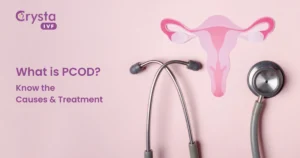Laparoscopy has been used to treat a variety of medical conditions for decades. In recent years, it has also been used as an infertility treatment. Laparoscopy in infertility can be used to diagnose and treat problems with the reproductive organs, such as endometriosis or fibroids.
In about 40% of cases where a woman cannot conceive, the cause can be traced to factors such as blockages in the fallopian tubes, endometriosis, adhesions, or growths of scar tissue that make it difficult for conception to take place.
In such cases, a Laparoscopy surgery may be performed to diagnose and assess the causes of infertility in the uterus, fallopian tubes, and ovaries.
But what exactly is laparoscopy surgery?
When is it recommended?
And, how is it an effective procedure to overcome infertility issues in females? Let’s briefly understand the role of laparoscopy in infertility.
Laparoscopy Surgery – What Is It?
Laparoscopy is a type of surgery that uses small incisions and a short recovery time. It is often used in fertility treatments to diagnose and treat reproductive disorders. Laparoscopy can be used to remove scar tissue, endometriosis, or ovarian cysts.
It can also treat blockages in the fallopian tubes or other areas of the reproductive system. Approximately one-third of women who undergo laparoscopic surgery become pregnant within one year.
When Do You Need Laparoscopy Surgery?
While having difficulty conceiving is itself the biggest sign that you may require your pelvic region evaluated through laparoscopy. However, here are a few other signs and conditions that require the diagnostic procedure or surgery –
- Chronic conditions like Endometriosis
- Pain in the pelvis or abdomen
- Lump in abdomen
- Heavy menstrual periods
- Blocked fallopian tube
Endometriosis And Laparoscopy
Women with health conditions like endometriosis that may affect their infertility are also recommended laparoscopic surgery.
Endometriosis is a chronic health condition where the tissue grows outside the uterus, ovaries, and tubes and sometimes in the bladder or intestines. The tissue is similar in makeup to the womb’s inner lining (endometrium).
These growths may cause swelling and bleeding, blocked fallopian tubes, form scar tissue, and affect your intestines and bladder. In other cases, it can also grow inside the ovary or ovaries and form a cyst.
If you have signs of endometriosis or you’re already diagnosed with the condition, a laparoscopy surgery can be carried out to help identify the issue and correct it.
Endometriosis may make it difficult to get pregnant, but it is not impossible. With treatment, many women with endometriosis can conceive. However, success is not guaranteed with any medical procedure or surgery. If you are diagnosed with the condition and do not become pregnant within six months after laparoscopy surgery, your doctor may recommend advanced fertility treatments such as in vitro fertilization (IVF).
How Is Laparoscopy Performed?
- Diagnostic laparoscopy is generally carried out under general anesthesia so you won’t feel any pain during the procedure.
- A needle will be inserted by making one or more small incisions in the abdomen.
- The abdomen is inflated with gas to make it easier to see the uterus and other organs during the surgery.
- A fiber-optic tube with a light and video camera is inserted through incisions after removing the needle.
- A small tool called a probe is also inserted by making a second incision to move or lift organs out of the way.
- With the help of a camera, the surgeon will examine the structures in the abdomen & other pelvic regions.
Laparoscopy surgery helps determine if there is any blockage in the fallopian tubes that could be causing fertility issues. In some cases, laparoscopy for infertility can even be used to help position the uterus for in-vitro fertilization (IVF) procedures.
If a surgeon sees any abnormalities, they may try to correct them during surgery. This include –
- Removing scar tissue or adhesions with a laser beam or electric current
- Open blocked fallopian tubes
- Other abnormalities, if any
Common Risks Associated with Laparoscopy Surgery
Though Laparoscopy is a less invasive procedure, as, like any medical procedure & surgery, it involves certain risks and complications. This include –
- Formation of adhesions
- Allergic reaction
- Vaginal bleeding
- Damage to the internal organs
- Nerve damage
- Pain in the shoulders or abdomen
- Blood clots
The laparoscopic procedure is much less invasive than traditional open surgery, and as a result, patients typically experience a quicker healing process.
However, it’s still important to have regular follow-up appointments with your doctor to ensure that the incision is healing properly and that you aren’t experiencing any pain. Additionally, there are many precautions you should take after surgery before resuming normal activities.
What to Expect After Laparoscopy Surgery?
Laparoscopic surgery can help improve fertility for many women. The success rate of Laparoscopy in improving fertility is relatively high, with approximately one-third of women who undergo the procedure becoming pregnant within one year.
This minimally-invasive surgery can make a big difference for couples struggling to conceive. However, if a severe medical condition is found, your doctor will discuss available treatment options to address the condition.
If you do not become pregnant within six months after laparoscopic surgery, your doctor may recommend additional fertility treatments such as in vitro fertilization (IVF).
To Summarize
Laparoscopy surgery has a crucial role to play in tackling infertility. The procedure is generally safe and has a short recovery time, making it an ideal treatment option for many patients struggling with fertility issues.
You must work closely with your fertility doctor to minimize risks and effectively overcome infertility.
The team of doctors at Crysta IVF fertility centers in India has years of experience performing ART & diagnostic procedures. They have an excellent success rate for infertility treatments due to their skill and expertise. Get a consultation now to learn about the cost of laparoscopic surgery and if it is right for you.




